|
|
| 'Like' us on Facebook | Follow us: |
Posted on: Oct 28, 2014
Value of Vegetarianism
- Part 1
As part of Afternoon Satsang Segment on Thursday Live, hosts Prem and Arvind touched a raw nerve when they took up the hot button topic of Vegetarianism (on 27 Feb and 6 March 2014). The favourable listeners' feedback inspired us to present before you this comprehensive article on the value of Vegetarianism. Those who live and pray, and will do so for centuries, in the name of Bhagawan Sri Sathya Sai Baba, deserve crystal clarity on this sensitive issue.
Coinciding with the World Vegetarian Month and the Ebola outbreak in West Africa, in this report, we dive deep into the cross currents that engulf this subject and explore it from every possible front. Cutting through the last shred of ambiguity that can arise due to arguments of personal choice and health, we present the cold facts, reminding us why our food intake must be a conscious choice because of the conscious, subconscious and unconscious consequences it carries.
listen to the Sathsangs
To include animal food in one's menu or not... used to be one of several classic debates that seem to have no end or solution in sight. Either of the ‘warring’ camps swore by the benefits of their stand. Today, from economics to environment, from science to spirituality, compelling evidence is tilting this debate in favour of one particular choice.
Now, even as your minds are running furiously to choose your side in this ‘war’ along with the thousand reasons for the same, let us define the scope - the operational boundaries - of this article so that things are understood and assimilated within a reasonable perspective.
Clearly, this article is meant for those who consider ‘spiritual growth’ a life priority. However, it is suitable for the rest as well because a large part of it is based on scientific data and observations. Naturally, it derives heavily from the teachings of Bhagawan Sri Sathya Sai Baba and therefore hopes to serve as a holy grail for His devotees.
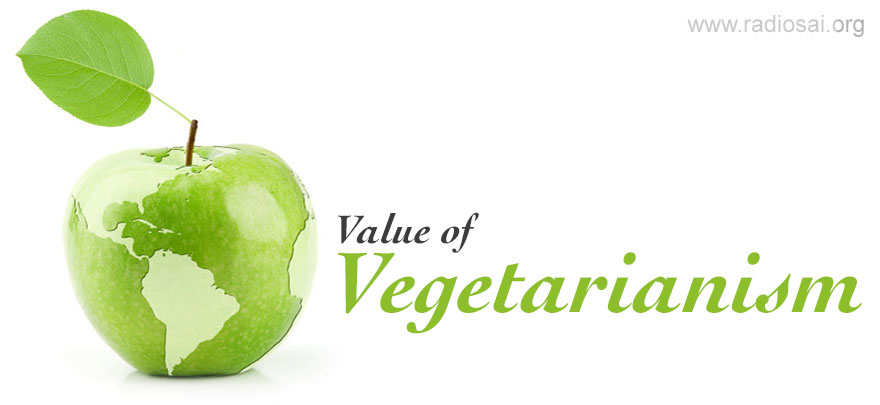 |
The question that now arises is why on earth is an 'article' necessary to convey what Swami has said regarding this debate. A cursory look at His life and His discourses state the answer emphatically. Even though He was born into a Kshatriya (warrior class) family that traditionally consumed meat, since His childhood, Baba never touched non-vegetarian food. He discouraged His friends, classmates, family members and village residents also from consuming animal flesh. In His words too, He is as vociferous as in His actions when it comes to the question of consuming meat. Here are a few snippets from some of His discourses where Swami clearly states what he expects from His devotees:
1. Today, let it be anyone, whether one deems himself a devotee or not, he should give up meat caring. Why? Meat eating promotes only animal qualities. It has been well said that the food one consumes determines one's thoughts. By caring the flesh of various animals, the qualities of these animals are imbibed. How sinful is it to feed on animals, which are sustained by the same five elements as human beings! This leads to demonic tendencies, besides committing the sin of inflicting cruelty on animals. Hence, those who genuinely seek to become devotees of God have to give up non-vegetarian food. Calling themselves Sai devotees or devotees of Raama and Krishna, they fatten on chicken. How can they be deemed Sai devotees? How can God accept such a person as a devotee? Therefore, whether they are devotees in India or outside, they should give up from this instant meat eating. Discourse on 23rd November 1994. 2. If you have to be happy, today, as an offering to Swami, give up meat eating, consuming liquor and smoking. By renouncing these three, you will benefit yourselves as well as society and the nation. Swami's sole aim is to promote the welfare of the family, the society and the nation. If you wish to follow and carry out Swami's wish, renounce from this moment itself these three bad practices. Do not put if off to tomorrow. Why? If you go on saying next, next and then it becomes test and then it becomes taste. No. Right now, take the resolve from this moment. This is what Bhagawan is expecting from you today. Therefore, being the embodiments of love I expect that you will certainly follow this; give joy to Swami thereby promote the wellbeing of your family and the nation, I bless you all and bring the discourse to a close. Discourse on 23rd November 1994. 3. We must teach our students to practise Sai's teachings, so that their parents can learn through their children studying in our schools. For example, the parents of a student may be non-vegetarian. When the student goes home for vacation, he can bring about a change in his parents by narrating to them with humility the sanctity of eating vegetarian food. The student can tell his mother, "Mother, I cannot eat the food prepared by killing another living being. This is not good for me. This body, which is made up of flesh, should not be fed on flesh. Our body needs sacred food and not flesh. Eating of flesh will induce in me animal tendencies. We should eat only sacred vegetarian food which God has provided for us." Thus, we can teach the parents through the students. And in course of time, even the parents will stop eating non-vegetarian food. I know many families who have stopped eating non-vegetarian food after their children joined our institutions. I do many things through students. Discourse on 21st November 2001. |
Coming back to the question,
“Why camouflage a clear-cut directive from Swami as a debate?”
That is because we may firmly believe in what Swami says but are unable to stand up ‘scientifically’ and defend ourselves when posed with uncomfortable questions. These questions need not come only from diehard, non-vegetarian fans but even from our own inquisitive children! A few of us may also wonder whether it is not sufficient to follow any one (or two or three) of Swami’s teachings (it is better than not following anything at all isn’t it?) and so, refrain from giving up animal based diets. And finally we may also be blissfully ignorant of the multi-level repercussions involved in meat-eating. So now that you are clear on which side of the ‘debate’ Swami (and therefore we) stand, you can either choose to simply shut this page and do ‘better’ and ‘more interesting’ things in life, or read ahead and stay informed of the facts from every possible angle. Well-informed choices we hope will help us all reap positive consequences.
The environmental angle
Swami often speaks of a four tier hierarchy that connects the individual to God. He says that Vyashti (individual) is a limb of Samashti (society) which is, in turn, a limb of Srishti (Nature) which is a limb of Parameshti (God). The Parameshti angle towards non-vegetarianism is crystal clear from Swami’s life and teachings. The Srishti or environmental angle presents very persuasive arguments and conclusions too.
A question of sustainability
To start off, let us visit our primary school days where we were taught Lindeman’s ten percent law. It is known that plants are able to absorb only 1 percent of the sun’s energy for primary production and can store only 10 percent of that 1 percent. This is available for the herbivores or plant eaters. Lindeman’s law further states that when these herbivores are consumed by the next trophic level, again only 10% of the energy in the food is fixed into animal flesh which becomes available for next trophic level which is secondary carnivores. Let us consider a food chain like this:
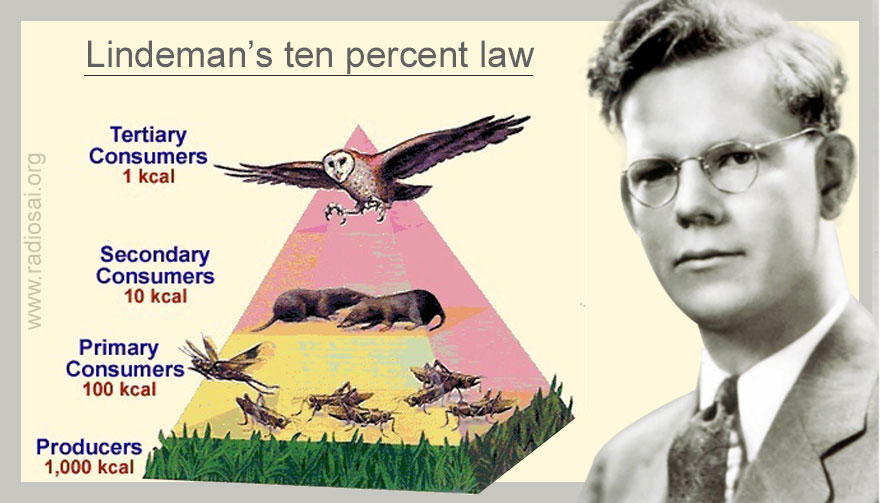 |
Sunlight - Grass - Grasshopper - Lizard - Snake
Suppose the snake is about 2 kilograms in weight. Working backwards and using Lindeman’s law, we deduce that there needs to be at least 20 kilograms of lizards in the ecosystem. That would imply the presence of at least 200 kilograms of grasshoppers and that, in turn, would need about 2000 kilograms of grass. In short, a 2kg snake needs 2000 kilograms of grass for its sustenance. This is definitely oversimplified because a snake could directly consume grasshoppers but it serves to highlight a point. And that point is:
The higher one goes in the food chain, the greater is the plant resource needed to sustain life. (This is because other than plants, no other life form can fix sunlight a food.)
Of course, there are many who argue that Lindeman’s 'efficiency of transfer' law is primitive and almost humbug. There is no arguing the fact that considerable variation exists in the efficiency with which organisms exploit their food sources. But there is no arguing this fact too that the maximum efficiency for exploitation is about 70 percent, with the average tending towards 30 percent. Larry Slobodkin’s paper deals more with this. So, maybe we can modify Lindeman’ law into a ‘thirty percent law’. Even then, vegetarianism is the better news.
It is child’s logic to realize that we would need larger tracts of land to grow plants if we choose to meet our body-meat needs via meat rather than plants. An eighty kilogram person (going by the 30 percent law) will need about 270 kilograms of plant/meat for sustenance. If he/she opts for meat, that meat would need about 900 kilograms of plant. By turning vegetarian, the 80 kg person is saving the earth the need to grow another 630 kilograms of plants! It was this kind of ‘cold logic’ that convinced Graham Hill of Treehugger fame to become a ‘weekday vegetarian’ - because he felt that being a complete non-vegetarian goes against sustainability of the environment! An environmentalist turned part-vegetarian! He presented his powerful and pragmatic suggestion to non-vegetarians in a 5-minute TED talk.
Environmental sustainability is severely hit by meat production via another fast-disappearing, vital resource - water. According to a waterfootprint.org report, on an average, a ton of potatoes need about 330,000 litres of water for production. The production of the same quantity of beef needs, on an average, 16,726,000 litres of water; 50 times more water!
Polluting arguments
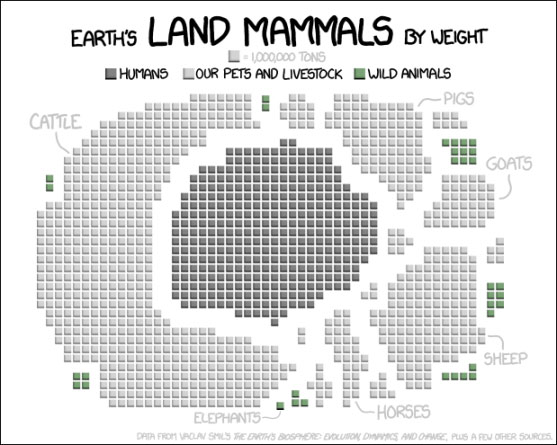 |
Now, if that was a ‘quantitative’ impact on environment, here is a shocking ‘qualitative’ impact. As this image of earth’s land animals by weight shows, humans are not the most ‘mass’ive among earth’s creatures. That position is taken up by cattle which occupy the earth with twice as mass as humans! They need grazing lands or huge fields where their feed (usually corn) is grown. For this, large tracts of land have been cleared of life sustaining forests, thereby destroying the biodiversity in many places on earth. This is something very serious to consider when, according to a UN report, more than 26% of the Earth’s terrestrial surface is used for grazing and 33% of all arable land is used for cattle-feed production.
Also spare a thought about all the ‘bullshit’ that happens where non-vegetarianism is concerned. It might come as a shock that nearly 20% of all the greenhouse gases (the culprits responsible for global warming and the associated dangers) emissions are due to cattle - that is more than what all the vehicles around the world generate! This is because, apart from carbon dioxide, cattle guts produce methane gas and the manure from dung produces nitrous oxide gas, both which are more polluting than carbon dioxide. One might say that emissions occur from proteinaceous plants as well. In contrast to meat, most of plant proteins’ emissions are generated after crops leave the farm (processing, transport, cooking and waste disposal). Pollution from animal wastes however is not restricted to the air alone.
We people hear the word "lagoon" and picture blue water, surrounded by palm trees, perhaps, or with mountains in the background. A visit to a factory farm (that is what the place which ‘grows’ cattle for the meat industry is called) would quickly erase this beautiful image from their minds. At factory farms, a lagoon means an open-air pit filled with urine and manure. And that too, lots of urine and manure as some lagoons are larger than seven acres and contain as much as 20 to 45 million gallons of wastewater! The lagoons can leak or rupture or they can be filled too high and overflow after a rain. That opens a Pandora’s box of problems from harmful algal blooms to fish kills and ground-water contamination to disease transference. To keep the cattle healthy, a lot of antibiotics are dumped into their feed which naturally gets excreted. These antibiotics breed resistance in the bacteria and other microbes making diseases harder to treat. But even if none of these problems occur, the lagoons still release toxic and stinking gases.
 |
Bio-magnification
Finally, there is the ‘Bio-magnification’ problem. It can be easily understood from the food chain example that has already been presented. It is a known fact that varieties of chemicals in the form of fertilizers, pesticides and weedicides abound on the plant produce. These chemicals are not broken down by the animal body and hence tend to accumulate within. Assuming that the grass in the food chain has 1 ppm (parts per million) of chemicals, this is what happens.
Sunlight - Grass - Grasshopper - Lizard - Snake
The grasshopper is gifted with 10 ppm of chemicals. The lizard has 100 ppm while the snake gets 1000 ppm of the same chemicals! (Assuming the 10 percent law here). The higher the organism in the food chain, the higher is the concentration of chemicals in the body. The success of top predatory-bird recovery (eg: bald eagles, peregrine falcons) in North America following the ban on DDT use in agriculture is testament to the importance of biomagnification. It is definitely safer for humanity as a whole in this sense to consume plants directly rather than consuming the animals fed on plants. Now imagine the dangers of eating higher-level animals considering them as delicacies!
Meat eating - a speculative or definitive need?
An argument that many non-vegetarians bring up is this - what should a person staying in, say the Arctic, do about food. Or for that matter, there are spaces on earth where growing food is impossible and one has to depend on meat. Unless of course one is on some world saving mission there, we should not even be there. Besides, this is a situation created by nature itself! What do you do then?
Such a situation is more of an exception while this article is a general one. Cancer treatment, for example, makes use of cell-poisoning through chemotherapy. Cancer is an exceptional case where poisoning the body to an extent is necessary. That does not mean that everyone should take doses of these poisons. In other words, meat-eating might be a necessity in some spaces of the world. That should not make it a ‘need’ in every part of the world! Sadly, that is what has happened. We will deal with how this has come about, and the result of such thinking, in the next part of the article.
The socio-economic angle
Mr. Ramesh (name changed to maintain anonymity), a store assistant in Puttaparthi village, earns about Rs.6,000 a month (a little more than $100 a month). Despite his limited resources, he admits that he cannot help but cook meat once a week at least. While most of the vegetables or cereals cost about Rs.50 a kilogram, chicken costs Rs.250 a kilogram. His weekly chicken dinner 4 times a month translates into Rs.1,000 a month expense instead of Rs.200 for veggies. The economic burden of his choice startles him but he sighs with resignation, “What can I do sir? I can’t give up meat.”
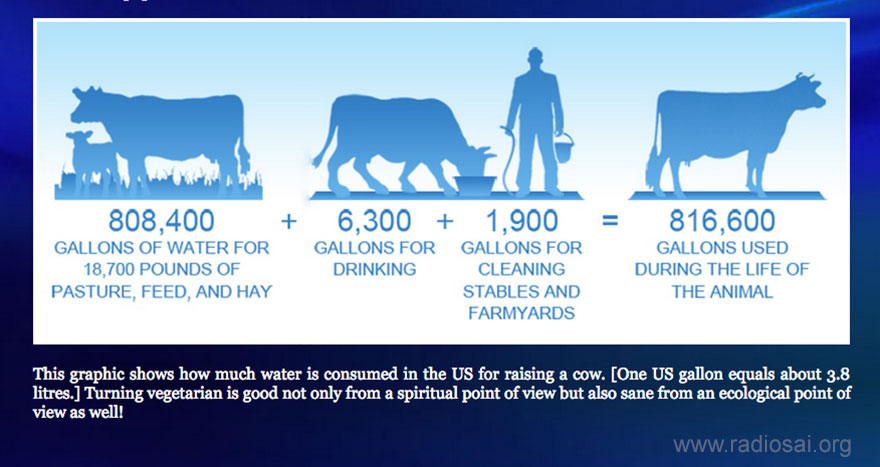 |
Fize Mohammad, a financial consultant from Trinidad & Tobago says, “Whenever I meet a person who says that he/she cannot invest, insure or save because of daily necessary expenses, I gently suggest them to consider cutting down on smoking, drinking and eating meat. The potential for saving is so substantial that clients are pleasantly shocked at growth prospects they can achieve within a decade.”
Mahatma Gandhi, when explaining the vegetarian practices of India to his vegetarian friends in England, put it this way:
"In practice, almost all the Indians are vegetarians. Some are so voluntarily, and others compulsorily. The latter, though always willing to take, are yet too poor to buy meat. This statement will be borne out by the fact that there are thousands in India who have to live on one paise a day. These live on bread and salt."
Economic conditions need not be as bad as that to realise the ‘investment potential’ of vegetarian food. Every stage of meat-processing is more resource-intensive than its vegetable counterparts. Cleaning the meat needs more time and more water. Cooking it requires greater energy, greater effort and greater time. In fact, there are many vegetarian foods - fruits and vegetables - that can be consumed raw. There is very few such equivalent in the meats – almost everything needs some processing. Finally, even cleaning up after cooking meat requires greater time, energy water and detergents!
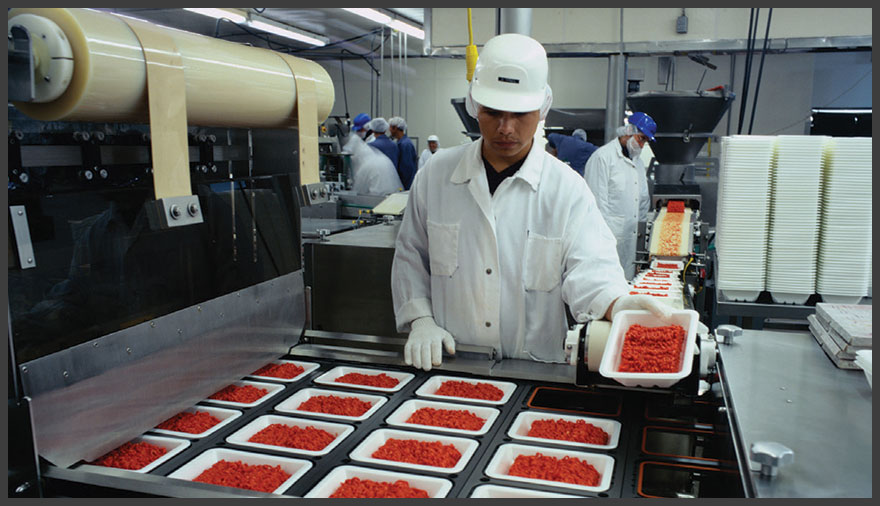 |
What happens at the micro-level at home extrapolates at the macro level too. Higher costs for refrigeration and transportation of meat weighs financially on an economy in the same manner that meat-eating weighs on an individual or family. What about cold storage for vegetables and fruits? Well, for one, vegetables and fruits have to be transported and stored anyway because one can live on a solely vegetarian diet but one cannot survive like that on a solely meat diet (like a lion or shark). Even a meat eater needs his/her share of fruits and vegetables. Secondly, growing vegetables and fruits is much easier compared to growing animals and almost every place has a good share of its local produce.
The health angle
So, let me say that I don’t care about the environment, nor do I care about the cost to society. I earn well and so I eat well. And I earn well enough to insulate myself against any harm environment can do to me. Can I now eat meat and be comfortable?
It is practically impossible to insulate oneself from all the environmental ‘harm’ at least for a majority of the people. For the minority too, it might be only theoretically possible. However, even if one has these questions, meat eating hits because of the impact it has on one’s own body. And here, body is not just the physical one but also the subtle/mental body.
The idea here is even if one is not able to buy in arguments of ‘selflessness’, the arguments of ‘enlightened selfishness’ will work. This is because, paradoxically, in order to be selfish, one has to be selfless and vice versa. Confusing? Well, it will become clear very soon, once we explore the devastation that meat-eating wreaks on the human body.
An invitation to disaster
An internet search on the health problems with vegetarian and non-vegetarian diets throws up hundreds of apparently conflicting results. There are articles and studies which show how meat eating increases risk to cancers of many kinds, how one should definitely reduce meat but not eliminate it completely and some which say that organic meat is good, though not unsubstitutable. There are cases which point out the dangers of strict vegan diets but that does not actually put down a vegetarian diet!
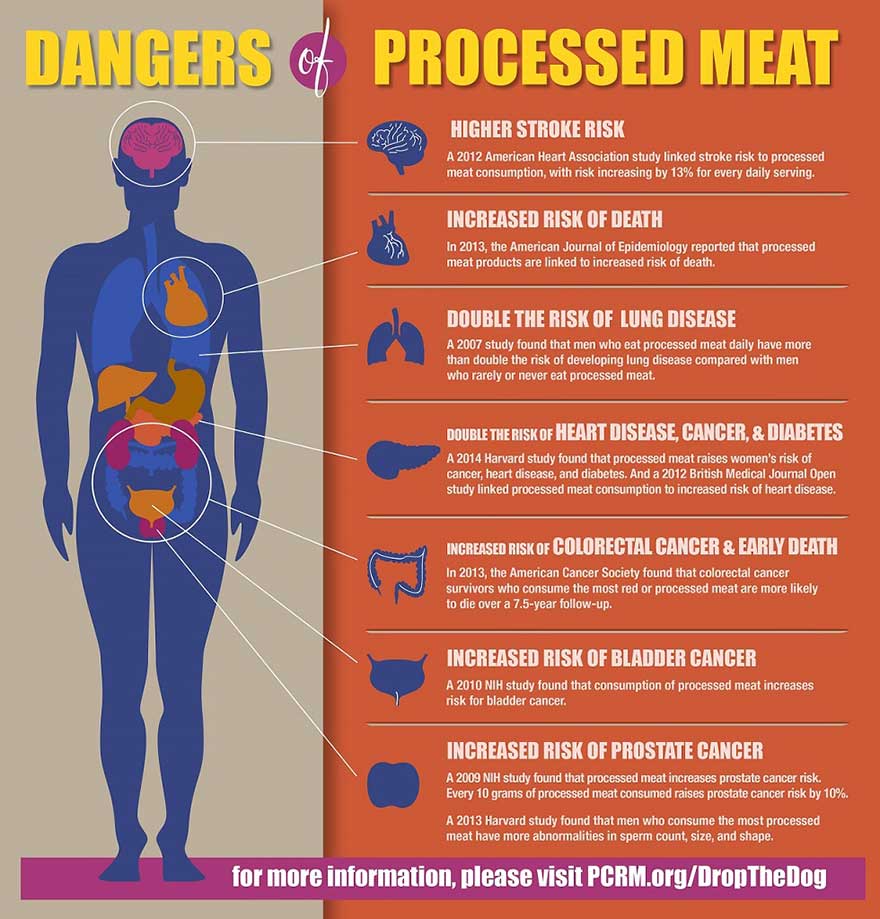 |
Courtesy: pcrm.org
|
Notice the term ‘apparently’ being used before the word ‘conflicting’. There is a reason for it. If you get confused because of these opposing studies, it is best to see where people are ready to put their money in. And that is because, where money is concerned, everyone talks of business and things arrive to the brass tacks. Did you know that life-insurance companies give greater discounts and cheaper premiums to vegetarians? That is what articles in several news agencies like Daily Mail and The Guardian confirm about several insurance companies. Insurance companies are driven by only one objective - money - and so we can expect their outlook to be objective! If they feel that vegetarians have better health and lifespan, there definitely is some truth in it!
Apart from going that route, let us also follow Swami’s dictum, “The proper study of mankind is man.” By this statement, Swami says that if one wants to understand mankind, one has to understand man. And to understand man, one has to understand the human body. That is what we will approach with our problems in diet - an anatomical study.
Comparing organs and organ-systems, we see that a lion’s kidney is twice the size of a bull’s, and not much smaller than that of the elephants'. The human kidney pales in comparison to it! This allows the lion to handle large amounts of protein and nitrogenous waste products contained in its natural flesh diet. The lion also has a huge liver which secretes larger amounts of bile into the small intestine than does the herbivores’ liver. There is a direct relation between the quantity of meat eaten and the amount of bile secreted. Meat-eating therefore, places a strain not only on the kidneys but also on the small liver of humans which impairs the organ's function over a long period of time. The comparative anatomy of a carnivore, herbivore and omnivore brilliantly brings out many such differences.
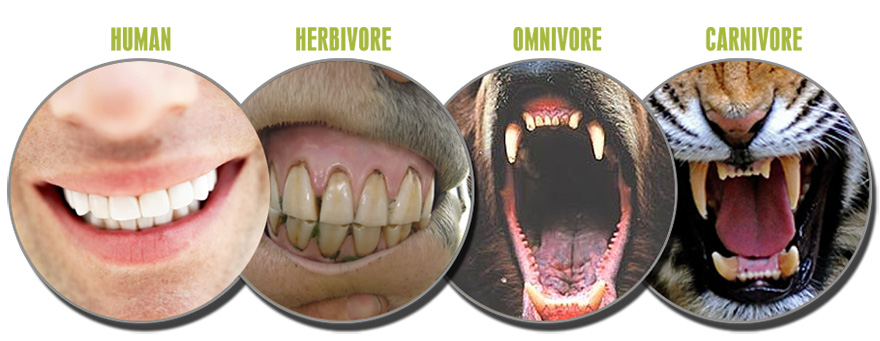 |
These apart, a non-vegetarian diet makes the digestive system susceptible to a host of parasitic infections. It's almost like karma coming back to get you - you eat other organisms and other organisms will eat you! Bacterial infections, tapeworm infestation, liver fluke attacks and viral illnesses are most of the times due to meat foods according to a US department of Health and Human Services report. The Physicians Committee for responsible medicine states strongly that male health issues including ED are also linked with some meats.
Bushmeat leads to an international Ebola crisis
Dr. Margaret Chan, the director general of the World Health Organization described the recent outbreak of Ebola in West Africa as “unquestionably the most severe acute public health emergency in modern times which has progressed from a public health crisis to a crisis for international peace and security...I have never seen a health event threaten the very survival of societies and governments in already very poor countries... I have never seen an infectious disease contribute so strongly to potential state failure.”
And as we lament the rising threat of Ebola, the cause remains an animal based food choice, in this case bushmeat.
Mental afflictions?
There is a far subtler yet scarier way in which meat eating affects health. This could possibly be classified as a physiological and psychological event. Any animal, prior to its slaughter, undergoes stress. In animal farms where cruelty to animals is unimaginable, the stress levels are extreme. A basic understanding of how stress functions is necessary here. Adrenaline is the major stress hormone that is released into the bloodstream. It is called the “fight or flight” hormone because that is what it encourages the animal to do. After the animals have been slaughtered, those hormones remain in their bodies and begin to alter the animal meat. The quality of the meat deteriorates significantly. That apart, when you eat the tainted animal meat, you ingest those hormones into your body. Doing so can cause a host of unwanted medical conditions and diseases at physical, mental and emotional levels. It is no surprise then that the highest number of prescriptions of anti-depressants and anti-anxiety medication are filled in higher meat eating societies.
Organic/Vegetarian Meat
Of course, one may think that ‘organic’ meat would be good and safe. That is definitely a point for the meat eaters to score. However, ‘growing’ organic meat is more resource-intensive and thus costs more too. Organic meat will gather more negative points on the first two issues discussed viz. the environmental angle and the socio-economic angle. The concept is still under experimentation, making it too early to evaluate its long term impact on health and economy.
In the following part we will discuss to understand how vegetarianism is a need that goes much further than just environmental, economical and health related concerns.
What do you think about this article? Please let us know by writing in to h2h@radiosai.org. Do not forget to mention your name and country.









